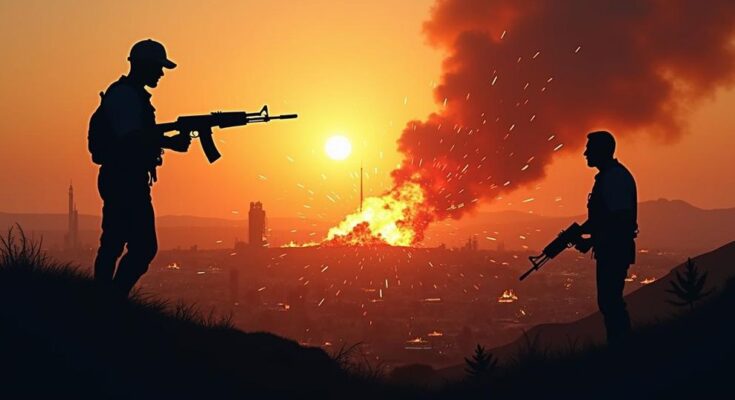Iran is weighing its response to Israel’s military strikes on Lebanon, following the assassination of Hamas leader Ismail Haniyeh. Despite prior restraint, analysts suggest Iran will likely respond decisively amidst escalating violence. The Iranian leadership balances the need for retaliation while managing regional tensions and the implications of U.S. military presence.
The ongoing Israeli military campaign against Lebanon has prompted intense speculation regarding Iran’s potential response. Analysts suggest that while an Iranian reaction is assured, Tehran is likely to exercise caution in determining the nature and timing of its retaliation. This follows the assassination of Hamas official Ismail Haniyeh in Tehran on July 31, which Iranian officials have condemned as an affront to Iran’s interests. The Iranian leadership, including Supreme Leader Ayatollah Ali Khamenei, has vowed vengeance, acknowledging that the assassination of a key ally on Iranian soil calls for a significant response. In recent days, Israeli airstrikes on Lebanon have led to carnage, with reports indicating over 600 fatalities and significant destruction of infrastructure. The escalating violence presents a dilemma for Iranian leaders: they must balance the desire to retaliate against Israel’s aggression while maintaining strategic prudence. Analysts like Hadi Afghahi assert that the soaring intensity of Israeli attacks will necessitate a more immediate response from Iran, despite previous restraint exercised by Tehran amid ongoing conflicts in Gaza and the West Bank. Recent pronouncements by Iranian military leaders indicate a shift toward more direct retaliatory actions, with caution advised against blanket attacks that could exacerbate tensions further. Some experts speculate that Iran may opt for independent operations that utilize advanced military capabilities without fully integrating its allies such as Hezbollah. This includes the potential targeting of Israeli military or political figures, framed as a necessary measure of self-defense. Furthermore, Iran’s efforts to diplomatically engage with global powers regarding its nuclear initiatives remain steadfast, even as it condemns the violence in Gaza. President Masoud Pezeshkian’s moderate stance at the United Nations contrasts sharply with the complex realities in the region, as he reiterated Iran’s intent to respond decisively to threats against its sovereignty while also addressing humanitarian concerns. Despite potential provocations from Israel, Iranian officials are striving to maintain control over their strategic calculations. They seek to retain the initiative rather than react impulsively. The involvement of U.S. forces in the region post-assassination signals a precautionary stance against an Iranian escalation; however, Tehran aims for a response that balances unpredictability with calculated timing to ensure its self-defined objectives are met. Ultimately, the trajectory of Iran’s response will hinge on Israel’s actions and any perceived continued encroachment upon Iranian interests. Thus, the situation remains fluid, with significant implications for regional stability and international relations.
The backdrop of Iran’s involvement in regional conflicts is rooted in its support for groups such as Hezbollah and Hamas, both of which are seen as integral to Iran’s ‘axis of resistance’ against Israel. With the assassination of a key Hamas leader on Iranian soil, Iranian leadership feels compelled to respond to this direct affront. Israel’s military operations in Lebanon have reignited concerns of escalation, prompting speculation on how Iran will balance retaliation against the potential for broader conflict in the region. The interplay between military actions, diplomatic engagements, and strategic posturing by Iran’s leadership underscores a complex regional dynamic influenced by both historical grievances and contemporary geopolitical maneuvers.
The Israeli military actions in Lebanon have undoubtedly put pressure on Iran to recalibrate its strategic response, pushing it toward more direct retaliation. While awaiting a response to recent escalations, Iranian leaders maintain a cautious approach, emphasizing the need for calculated actions that safeguard Iran’s interests without igniting a larger conflict. The emerging dynamics illustrate a complex interplay between military assertiveness and diplomatic outreach, asserting Iran’s commitment to defending its sovereignty while seeking stability in a volatile region.
Original Source: www.aljazeera.com




